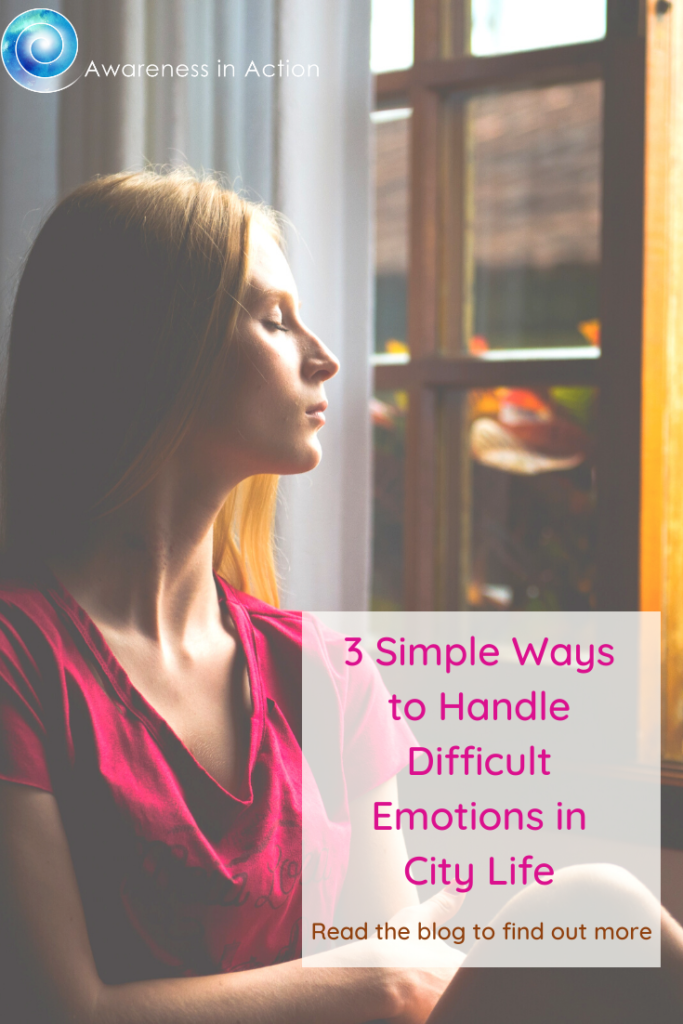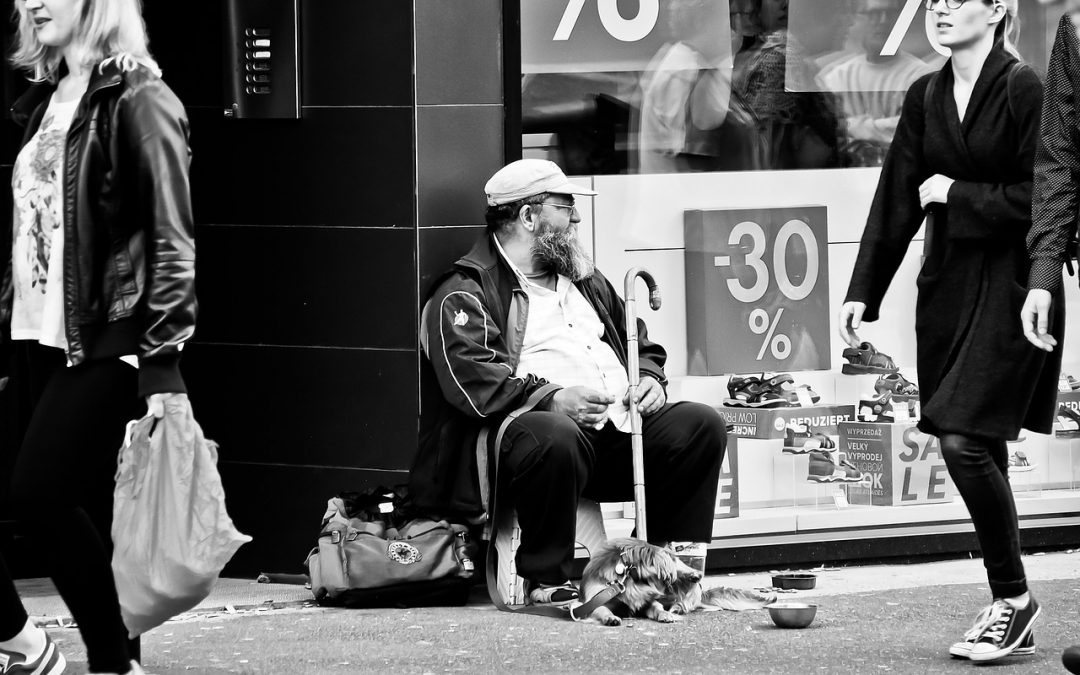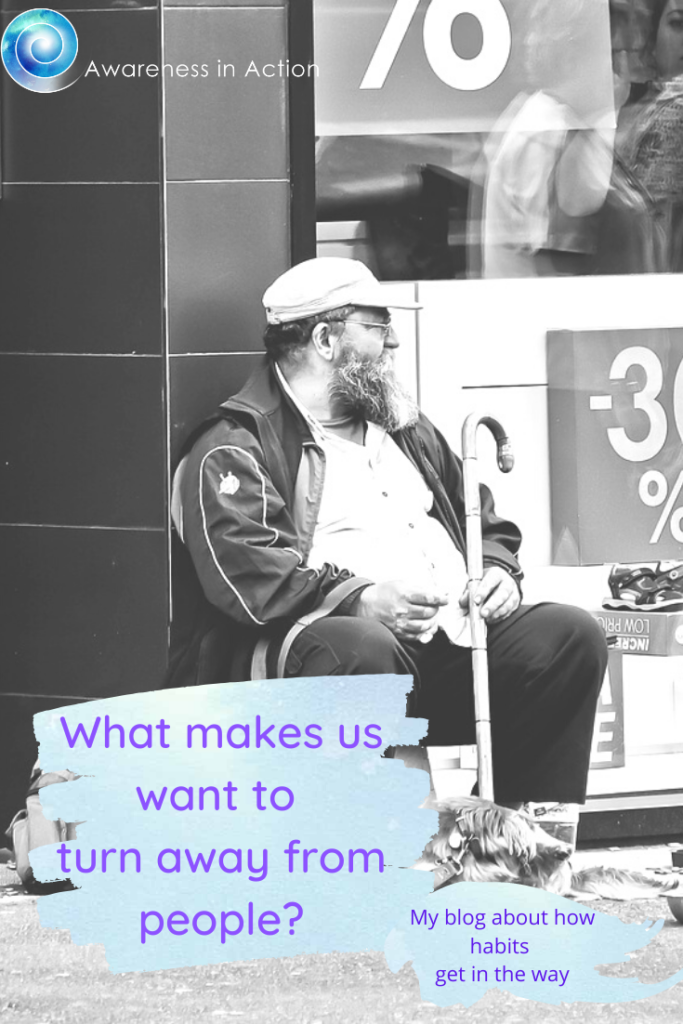
3 Simple Ways to Handle Difficult Emotions in City Life
For many of us, city life is crowded, busy, noisy and full of difficult emotions. We rush to work, along with all the other thousands of hurrying people. There’s traffic to negotiate, or crowded road crossings. All the time we are surrounded by adverts and billboards urging us to buy all kinds of things. There are countless pictures of glamorous models living perfect, wonderful lives that seem very distant from our daily routine. We might be aware of a vague longing for all kinds of things beyond our reach.
At the end of our working day we, have to do it all over again but now everyone is frantic to get home and in even more of a hurry. Perhaps we need to struggle through the supermarket crowds to pick up something for supper before we finally reach home. Even then, we cannot be sure of any peace and quiet. Maybe the neighbours are arguing, or someone across the road is playing loud music. One of my neighbours likes to do his washing late at night and everyone in the building can hear his ancient washing machine pounding away, as we get ready for bed. Once we are in bed, there is no guarantee things will settle down. We have a group of local teenagers who gather in the entrances of apartment buildings across the way and hang out until the small hours.
In the midst of all this our emotions can be pulled this way and that—irritations with things that go wrong, longing for things we cannot have and a vague, uncertain feeling of wanting things to be different. It’s exhausting and certainly adds to our stress.
So, what can we do? Here are three ways that I use to work with my difficult emotions as a city dweller.
1. Pay attention
When there are lots of things going on around you, it is all too easy to get pulled in all sorts of directions that have nothing to do with what you, yourself are doing at the present time. Have you ever walked along a familiar street and when you arrive at your destination, wondered how you got there? If you think about it, our lives are made up of many, many present moments—and it is important for us to notice this.
In 2010 two psychologists at Harvard University carried out some research into how we handle this moment-to-moment awareness. They discovered that for almost half of our waking hours we are thinking about something different to what we are doing, and that this does not make us happy. One of the times when they found most people’s minds were somewhere else was on their commute!
So, how do we pay attention? On a simple level—by trying to be mindful of what we are doing in each moment. If we are in a supermarket, we try to be present to walking up and down the aisles, choosing our goods and going to the checkout. If we find our minds drifting back to something else that happened in the day or anticipating what might happen later—then we just bring our attention back and let it rest.
The best way to learn how to make this part of your life is through meditation. Meditation is a reliable way of coming to know yourself and how you react. It helps us to calm our minds down and to be able to work with them more effectively.
How does this help in working with difficult emotions? It stops us from ruminating on something that might have annoyed us earlier or worrying about something challenging we need to do later. We tend to relive our upsets over and over again, which means that we draw out and exaggerate the emotions that go with them.
2. Don’t go there!
If we have been paying attention as we go through our day, there is more chance that we will notice if a difficult emotion is being triggered by something that is going on. When my neighbour’s washing machine starts up at 11.30pm, and I feel myself getting irritated I have a routine that I go through. I remember that there’s nothing that I can do about it; that he does not mean any harm (he’s actually a very nice guy), and if I get worked up then I won’t be able to sleep anyway. I call it, Don’t Go There!
You can try it anywhere for lots of different situations. You need to be familiar with the kinds of things that easily trigger your difficult emotions. Once you are aware of that, then you catch when a negative emotion is forming in your mind. Then you can look it in the eye and decide not to have anything to do with it.
Someone pushes you out of the way and instead of complaining about it, you just don’t engage. Another driver cuts you up on the dual carriageway—as you are about to curse, you just decide it is not worth it and let it go. Your boss shouts at you and instead of responding, you decide that to fight back will cost you more and get nowhere—so, you Don’t Go There!
3. Try to see things from another person’s point of view
This was brought home to me very strongly when I was out and about in Amsterdam recently. After a long bout of ‘flu, my partner and I were enjoying a trip into town for dinner and a movie. He went ahead to collect the cinema tickets and I made my way to the restaurant.
As someone who has rheumatoid arthritis, when I get tired my walking can get a bit unsteady. I came to a road junction and checked that it was all clear and began to step out into the road, when along the cycle track sped a young man on a scooter, with his girlfriend riding on the back. He saw me at the edge of the pavement and deliberating aimed his scooter towards me, making me wobble uncomfortably. He was delighted with my reaction and made a sort of ‘Ohhhh, ohhhh, ohhh!’ noise which he felt summed up my response.
He sped off laughing loudly, while I teetered on the edge of the pavement feeling a mixture of embarrassment, resentment and shame. It was too late to even think of trying, Don’t Go There! My difficult emotions had been triggered and were already too strong.
For a few moments I could only stand there but then I glanced up and just caught a glimpse of the girlfriend looking back at me. Her expression was concerned and a little embarrassed as well. It helped to bring me back. Instead of feeling abused, and sorry for myself, my attention went to the guy driving the scooter. It was a Saturday afternoon, he had a girl to impress and a chance to show his skill with the bike—after all, he never came near to hitting me.
When we are able to see things from another person’s point of view, even a little bit, it has a transformative effect. Instead of the situation being all about you and your reaction, suddenly there is room to see something about the other person. Much of the time, what we see helps us to feel more understanding. It can even touch our natural sense of warmth and kindness, so that the difficult emotions just fade away.

You might be interested in this new zoom+online course which starts on 15 June 2021 HOW DO YOU WANT TO FLOURISH IN YOUR RIPE OLD AGE?
Awareness in Action is dedicated to building a community of people interested in living a life of meaning and purpose based on sustainable wellbeing. If you would like to join with us, you could make a start by sharing and commenting on the ideas you find in the blogs on these pages. Your story is part of our journey.



